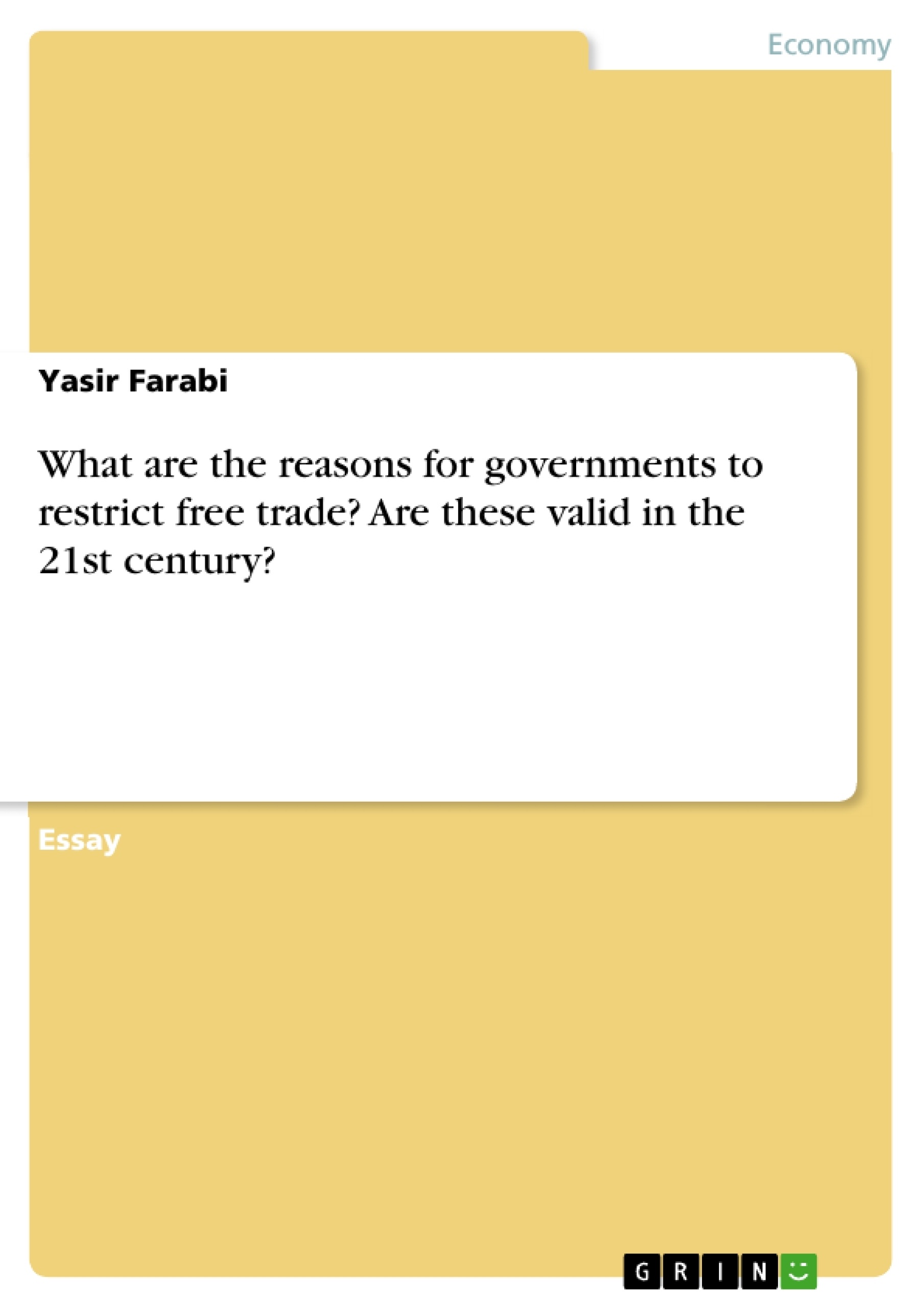The term “free trade” has different meaning to different interest groups. It is because of the different lenses through which people view events around them, the free trade debate is so complex. Although the economists have a notorious reputation for disagreeing about everything, one thing that almost all economists have always agreed is the desirability of free trade. However, it is a well-known fact that when it comes to matters of trade policy, it is all about politics and not about proven economic benefits of free trade, mainly due to political blindness and serving the needs of well-organized special-interest groups.
The purpose of this paper is therefore to shed light on the reasons for which government might restrict free trade and then analyse why these reasons are not valid in the 21st century.
Table of Contents
- 1. Introduction
- 2. Common arguments for trade barriers
- 2.1 Protect infant industries
- 2.2 Defend national security
- 2.3 Protect domestic employment
- 2.4 Shield domestic wages from being downgraded
- 2.5 Protect domestic industry from unfair trade
- 2.6 Protect customers
- 2.6 Trade retaliation
- 3. Justification of the validity of the reasons for trade restrictions
- 3.1 Infant industry argument
- 3.2 Trade destroys local job
Objectives and Key Themes
This paper aims to illuminate the reasons behind government-imposed restrictions on free trade and analyze the validity of these reasons in the 21st century. It examines common arguments used to justify trade barriers and assesses their economic impact.
- The economic arguments for and against free trade
- The role of special interest groups in shaping trade policy
- The impact of trade restrictions on various sectors of the economy
- The effectiveness of trade barriers in protecting domestic industries and jobs
- The long-term economic consequences of protectionist policies
Chapter Summaries
1. Introduction: This introductory chapter sets the stage by highlighting the complexity of the free trade debate, stemming from differing perspectives and the significant influence of political factors rather than purely economic considerations. It establishes the paper's objective: to investigate the justifications for government trade restrictions and analyze their relevance in the contemporary economic landscape.
2. Common arguments for trade barriers: This chapter delves into prevalent arguments supporting trade barriers, evaluating each with its corresponding economic effects. It systematically analyzes justifications such as protecting infant industries, safeguarding national security, preserving domestic employment, shielding domestic wages from decline, protecting against unfair trade practices (like dumping and subsidies), and employing trade retaliation. Each argument is presented with supporting evidence and examples, demonstrating their widespread presence in policy discussions and the complexities of their applications.
3. Justification of the validity of the reasons for trade restrictions: This chapter directly addresses the arguments presented in Chapter 2, assessing their continued validity in the 21st century. It critically examines the long-term impacts and limitations of protectionist policies, specifically highlighting the challenges of accurately predicting industry learning curves and the often-overlooked collateral costs of protection. The chapter emphasizes the importance of dynamic economic adjustments versus static protectionism and counters the claim that trade destroys jobs by highlighting the creation of jobs in sectors with comparative advantages.
Keywords
Free trade, trade barriers, protectionism, infant industry argument, national security, domestic employment, wages, unfair trade, trade retaliation, economic growth, comparative advantage, economic policy.
Frequently Asked Questions: A Comprehensive Language Preview
What is the main topic of this paper?
This paper investigates the justifications for government-imposed restrictions on free trade and analyzes the validity of these reasons in the 21st century. It examines common arguments used to justify trade barriers and assesses their economic impact.
What are the key themes explored in the paper?
The paper explores the economic arguments for and against free trade; the role of special interest groups in shaping trade policy; the impact of trade restrictions on various sectors of the economy; the effectiveness of trade barriers in protecting domestic industries and jobs; and the long-term economic consequences of protectionist policies.
What are some common arguments for trade barriers discussed in the paper?
The paper discusses arguments such as protecting infant industries, safeguarding national security, preserving domestic employment, shielding domestic wages from decline, protecting against unfair trade practices (like dumping and subsidies), and employing trade retaliation.
How does the paper assess the validity of these arguments?
The paper critically examines the long-term impacts and limitations of protectionist policies. It highlights the challenges of accurately predicting industry learning curves and the often-overlooked collateral costs of protection. It emphasizes the importance of dynamic economic adjustments versus static protectionism and counters the claim that trade destroys jobs by highlighting the creation of jobs in sectors with comparative advantages.
What is the structure of the paper?
The paper is structured into three main chapters: an introduction setting the context and objectives; a chapter detailing common arguments for trade barriers; and a chapter assessing the validity of those arguments in the 21st century. It also includes a table of contents, objectives and key themes, chapter summaries, and keywords.
What are the key takeaways from the chapter summaries?
The introduction highlights the complexity of the free trade debate and the paper's objective. Chapter 2 systematically analyzes common arguments for trade barriers with supporting evidence. Chapter 3 critically assesses the validity of these arguments, emphasizing dynamic economic adjustments and the limitations of protectionist policies.
What are the keywords associated with this paper?
The keywords include: Free trade, trade barriers, protectionism, infant industry argument, national security, domestic employment, wages, unfair trade, trade retaliation, economic growth, comparative advantage, economic policy.
- Quote paper
- Yasir Farabi (Author), 2012, What are the reasons for governments to restrict free trade? Are these valid in the 21st century?, Munich, GRIN Verlag, https://www.grin.com/document/197078




